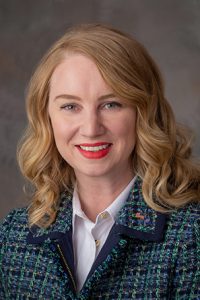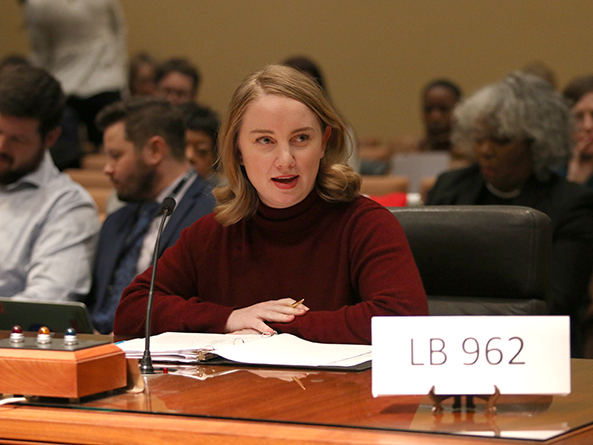Compensation for amateur athletes considered
College and university athletes could earn income under a bill heard by the Business and Labor Committee Feb. 3.

LB962, sponsored by Omaha Sen. Megan Hunt, would allow college athletes at public and private schools to earn money from their name, image and likeness rights. Only 2 percent of college and university athletes will go on to play professionally, Hunt said.
“Student athletes are the only college students who are prohibited from earning an income for their skills and talents,” she said. “LB962 is about the right of every student to work, to participate in the free market and have the same freedoms as their peers on college and university campuses.”
The bill would prohibit any postsecondary institution or athletic association from penalizing or punishing a student athlete who enters into a commercial contract, as long as it does not directly conflict with a team contract.
Jeremiah Sirles, who played football both at the University of Nebraska-Lincoln and at the professional level, spoke in support of the bill. Student athletes received monthly stipends of roughly $750 to cover living costs, he said, but many athletes sent large percentages of that stipend home to support their families.
Allowing athletes to capitalize on their popularity and support themselves through things like social media posts would make a significant difference, Sirles said, especially for those who may not go on to play professionally.
“Imagine [if those sending money home] could make an Instagram post for $700,” he said. “Now, imagine a guy like Adrian Martinez or Wandale Robinson or Lexi Sun. Now you’re talking about thousands of dollars that can set these people up for life after college.”
Ramogi Huma, executive director of the National College Players Association, also supported LB962. A vote for the bill is a vote for Nebraska football, he said.
“Nebraska football and other sports can be strong if the state affords college athletes the same economic liberties [given to athletes in other states],” Huma said.
Student athletes would be required to report any personal contracts to their postsecondary institution and would be barred from wearing a sponsor’s apparel or otherwise advertising for the sponsor during official team activities.
It also would allow student athletes to obtain professional representation to negotiate related contractual or legal matters. An athlete could seek civil damages against their postsecondary institution or athletic association if they believe their right to seek compensation has been violated.
The bill would take effect July 1, 2023.
Garrett Klassy, UNL senior deputy athletic director, testified in a neutral capacity. The university already is discussing athlete compensation for name and likeness, he said, but the issue is best handled at the federal level.
“Because we compete and recruit student athletes on a national level, we believe that all universities should abide by the same set of rules,” Klassy said.
No one testified in opposition to the bill and the committee took no immediate action on it.


